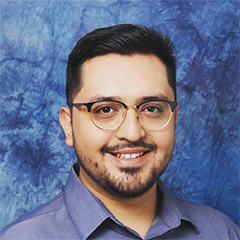 Over the last year, the criminalization of marginalized identities has increased substantially. Specifically, U.S. laws and policies that criminalize Lesbian, Gay, Bisexual, Transgender, Queer, Intersex, and Asexual (LGBTQIA+) people and undocumented individuals have even been debated at the federal level, creating uncertainty for many individuals. As a first-generation/low-income and queer individual, I am worried about how this type of criminalization impacts LGBTQIA+ farmworkers, who face intersectional impacts of anti-immigrant and anti-queer laws across the United States. Farmworkers are already a marginalized community; however, LGBTQIA+ farmworkers are further forced to live in silence due to the fear of being outed and discriminated against within their community. These are situations that I have faced personally and have determined how I approach the world and with whom I engage as my true unapologetic self. My current research focuses on understanding the community cultural wealth, or the array of knowledge that minoritized communities utilize to survive and resist forms of oppression; farmworkers hold to be agents in the changes needed structurally and ensure that their lived experiences serve as the catalysts to establish policies that support them justly. The increase in legislation criminalizing marginalized communities is unsurprising, considering that structural violence continues to create political, legal, economic, and cultural disadvantages for individuals stratified by U.S. society. Farmworkers in the United States are about 83% Latiné identified, and about 50% are undocumented. Many farmworkers face inadequate access to social services, safe drinking water, food insecurity, discrimination, and adverse mental health outcomes.
Over the last year, the criminalization of marginalized identities has increased substantially. Specifically, U.S. laws and policies that criminalize Lesbian, Gay, Bisexual, Transgender, Queer, Intersex, and Asexual (LGBTQIA+) people and undocumented individuals have even been debated at the federal level, creating uncertainty for many individuals. As a first-generation/low-income and queer individual, I am worried about how this type of criminalization impacts LGBTQIA+ farmworkers, who face intersectional impacts of anti-immigrant and anti-queer laws across the United States. Farmworkers are already a marginalized community; however, LGBTQIA+ farmworkers are further forced to live in silence due to the fear of being outed and discriminated against within their community. These are situations that I have faced personally and have determined how I approach the world and with whom I engage as my true unapologetic self. My current research focuses on understanding the community cultural wealth, or the array of knowledge that minoritized communities utilize to survive and resist forms of oppression; farmworkers hold to be agents in the changes needed structurally and ensure that their lived experiences serve as the catalysts to establish policies that support them justly. The increase in legislation criminalizing marginalized communities is unsurprising, considering that structural violence continues to create political, legal, economic, and cultural disadvantages for individuals stratified by U.S. society. Farmworkers in the United States are about 83% Latiné identified, and about 50% are undocumented. Many farmworkers face inadequate access to social services, safe drinking water, food insecurity, discrimination, and adverse mental health outcomes.
These conditions are not foreign to my own family's experience; as a child of former farmworkers and having an extended farmworker family, I saw the impact immigration status and laws had on our access to the Women, Infants & Children Program, Supplemental Nutrition Assistance Program, healthcare, and other essential social services. In the first years of migrating to the United States, my family and I depended on federally qualified free clinics and support provided by community organizations. At the same time, we were constantly cautious of using said services due to our mixed-status family and the fear that our undocumented family members would be targeted and deported. These fears consistently force us into social isolation leading to psychosocial challenges. The recent law passed in Florida, SB 1718, explicitly creates a hostile environment for undocumented individuals and families, furthering the criminalization and uncertainty experienced within the United States. This law follows the historical trajectory of past state legislation, such as Arizona's SB 1070 and Georgia’s HB 87, criminalizing undocumented individuals and further racial profiling to deter them from living within state boundaries.
As part of my dissertation work in the future, I will expand on centering farmworker community cultural wealth to address the health and social inequities being faced in the U.S. Specifically, I plan to set out a state-wide project to identify the issues faced by LGBTQIA+ farm workers in accessing health and social services and ways to inform new policy that supports their identity intersectionality. It is critical to act justly in times of uncertainty; we can not be docile in our approaches; instead, we must constantly act as if we can radically change the situations being faced by marginalized individuals. Surface-level thinking about social justice and health equity will not radically transform systems; we must be willing to challenge the current notions we hold, even if, in the process, we challenge our positionality in contributing to the injustices faced by individuals.
Resources for the Community
- Los Angeles City LGBTQIA Public Resource List
- California Farmworker Foundation
- Fresno LGBTQ+ Resource Center
- The Center for Sexuality and Gender Diversity
- LGBTQ Center Orange County California
- Farmworker Justice
- Billy DeFrank Center
- TODEC Center
- San Joaquin Pride Center
- Diversity Collective Ventura County
- Ventura County Farmworker Resources
- Sacramento LGBTQ Community Center
- CHIRLA
- SF LGBT Center
- TransLatin@ Coalition
- LGBT Connection
- Human Rights Campaign LGBT Resource List
- Oakland LGBT Community Center
- LGBTQ National Help Center
